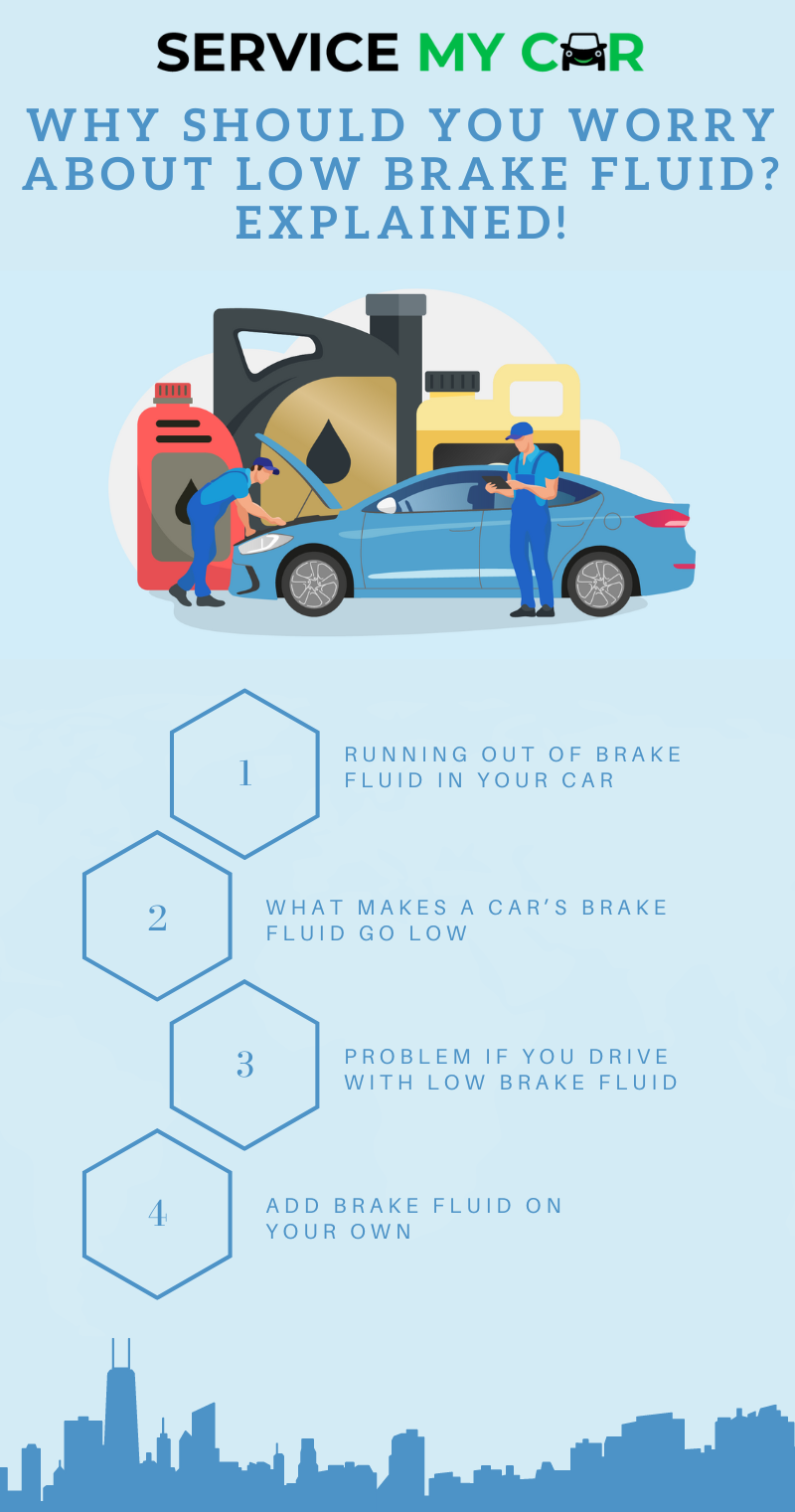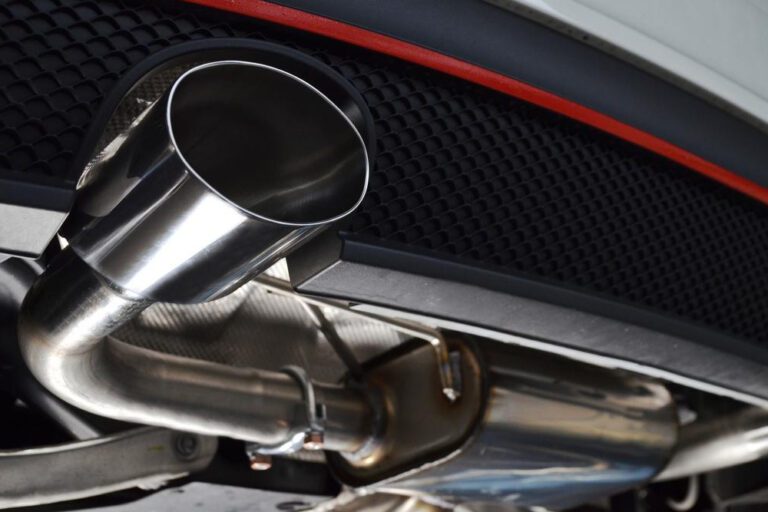What Happens When You Run Out of Brake Fluid
When you run out of brake fluid, your car’s braking system could fail, leading to dangerous driving conditions. Without enough brake fluid, you may experience decreased stopping power and potential brake failure, risking accidents and injury.
Proper maintenance and regular checking of your brake fluid levels are essential to ensure safe driving. Brake fluid plays a crucial role in enabling your vehicle to stop efficiently and effectively. We will delve into the importance of brake fluid, how to recognize when you are running low, and the potential consequences of neglecting this critical aspect of your car’s maintenance.
Let’s explore why brake fluid matters and what actions you should take to prevent a dangerous situation on the road.
Signs Of Low Brake Fluid
Low brake fluid can have serious implications for the safety and performance of your vehicle. It is important to recognize the signs of low brake fluid to ensure timely maintenance and avoid potential dangers on the road.
Brake Pedal Feels Soft
A soft brake pedal is a common indication of low brake fluid. When the brake pedal feels spongy or requires more pressure than usual to achieve the desired braking effect, it may be a sign that the brake fluid level is insufficient. This issue can compromise your ability to stop efficiently, posing a safety hazard.
Brake Warning Light Is On
Another unmistakable sign of low brake fluid is the illumination of the brake warning light on your dashboard. When the brake fluid level drops, the sensor in the master cylinder triggers the warning light to alert you of the potential problem. Ignoring this warning can lead to serious braking issues and should be addressed immediately.
Reduced Braking Power
Low brake fluid can result in reduced braking power, which is a potentially dangerous situation, especially during emergency braking scenarios. If your vehicle takes longer to stop or requires more distance, it could be due to decreased brake fluid, necessitating a thorough inspection and replenishment of the brake fluid reservoir.
Effects Of Running Out Of Brake Fluid
Running out of brake fluid can have severe consequences on your vehicle’s braking system. Let’s look at how this can impact your safety and the condition of your brakes.
Loss Of Brake Function
Without sufficient brake fluid, your brakes may fail to engage properly, leading to a loss of braking power.
Increased Stopping Distance
Running out of brake fluid can result in a significant increase in the distance required to bring your vehicle to a stop.
Potential Damage To Brake System
Inadequate brake fluid levels can cause damage to various components of your brake system, affecting overall performance.
Actions To Take When Brake Fluid Runs Out
Actions to Take When Brake Fluid Runs Out
Stop Driving Immediately
Brake fluid is critical for your vehicle’s braking system to function properly.
Driving without enough brake fluid can compromise your safety.
Check Brake Fluid Level
Inspect the brake fluid reservoir to assess the level.
If it is low or empty, it’s time to take action.
Refill Brake Fluid
Purchase the correct type of brake fluid recommended for your vehicle.
- Open the reservoir cap and slowly add the brake fluid.
- Avoid overfilling to prevent spills and damage.
Inspect Brake System For Leaks
Look for any signs of leaks in the brake system.
- Check the brake lines, connections, and calipers for any leaks.
- If you notice any leaks, have them repaired by a professional.

Credit: rubensmith.alboompro.com
Preventing Brake Fluid From Running Out
It’s crucial to understand the significance of preventing brake fluid from running out. Without an adequate amount of brake fluid, your vehicle’s braking system can become compromised, leading to potential safety hazards. Here are some essential practices to help you maintain the optimum level of brake fluid in your vehicle.
Regular Brake Fluid Checks
Regular brake fluid checks are essential for ensuring your vehicle’s braking system operates at its best. By examining the brake fluid level on a routine basis, you can identify any potential leaks or issues with the brake system. This simple preventive measure can prevent the complete depletion of brake fluid and help maintain your vehicle’s safety.
Scheduled Brake Fluid Replacement
Scheduled brake fluid replacement is an important part of vehicle maintenance. Over time, brake fluid can become contaminated and less effective, potentially leading to brake failure. A routine brake fluid replacement, as recommended by your vehicle’s manufacturer, can ensure that the brake system continues to function optimally, reducing the risk of brake fluid depletion and associated safety risks.
Importance Of Brake Fluid For Vehicle Safety
Running out of brake fluid can be extremely dangerous for your vehicle’s safety. Without enough brake fluid, your brakes won’t work properly, compromising your ability to stop and increasing the risk of accidents. Regularly checking and maintaining an adequate level of brake fluid is essential for a reliable and safe braking system.
Transfer Of Hydraulic Force
Brake fluid is a crucial component in ensuring the safety of your vehicle. It plays a vital role in the transfer of hydraulic force, allowing you to stop or slow down when needed. When you press the brake pedal, hydraulic force is applied to the brake system. Brake fluid, which is incompressible, then transfers this force from the brake pedal to the brakes themselves.
Heat Dissipation
Another important aspect of brake fluid is its ability to dissipate heat. Braking generates a significant amount of heat, especially during heavy or continuous use. Brake fluid helps dissipate this heat, preventing the brakes from overheating and potential brake failure. This ability to handle and dissipate heat ensures that your brakes stay efficient and effective, even during prolonged periods of braking.
Protection Against Corrosion
In addition to its hydraulic and heat-dissipating properties, brake fluid also provides protection against corrosion. Brake systems are exposed to moisture and other contaminants, which can cause corrosion and damage to vital components. Brake fluid serves as a protective barrier, preventing corrosion and ensuring the longevity of your braking system. Regularly checking and maintaining your brake fluid levels is essential to ensure optimal protection against corrosion.

Credit: www.quora.com

Credit: www.hoover-automotive.com
Frequently Asked Questions Of What Happens When You Run Out Of Brake Fluid
What Happens If You Completely Run Out If Brake Fluid?
If you completely run out of brake fluid, your car’s brakes will fail, making it dangerous to drive. Promptly refill the brake fluid reservoir and have the brakes checked by a professional mechanic to ensure safety.
What Are Symptoms Of Low Brake Fluid?
Common symptoms of low brake fluid include soft brake pedal, illuminated brake warning light, longer stopping distances, and leaking fluid under the vehicle.
How Long Can You Go Without Brake Fluid Flush?
It’s recommended to flush brake fluid every 30,000 miles or every two years to maintain optimal brake performance and safety.
Do You Need To Bleed Brakes If You Run Out Of Brake Fluid?
Yes, you need to bleed brakes if you run out of brake fluid. Bleeding removes air from the brake lines, ensuring proper brake function.
What Are The Signs Of Running Out Of Brake Fluid?
Signs of running out of brake fluid include spongy brakes, a low brake pedal, and a warning light on your dashboard.
Can You Drive If You Have No Brake Fluid?
No, driving without brake fluid can lead to complete brake failure and make it virtually impossible to stop your vehicle.
How Often Should Brake Fluid Be Checked?
Brake fluid should be checked at least once a year or during regular vehicle maintenance to ensure proper levels.
Conclusion
Running out of brake fluid can lead to serious safety risks. It can result in brake failure and compromise your ability to stop your vehicle safely. Regularly checking and topping up your brake fluid is crucial for maintaining the functionality of your brakes and ensuring your safety on the road.
Be proactive in monitoring your brake fluid levels to avoid potential accidents.

